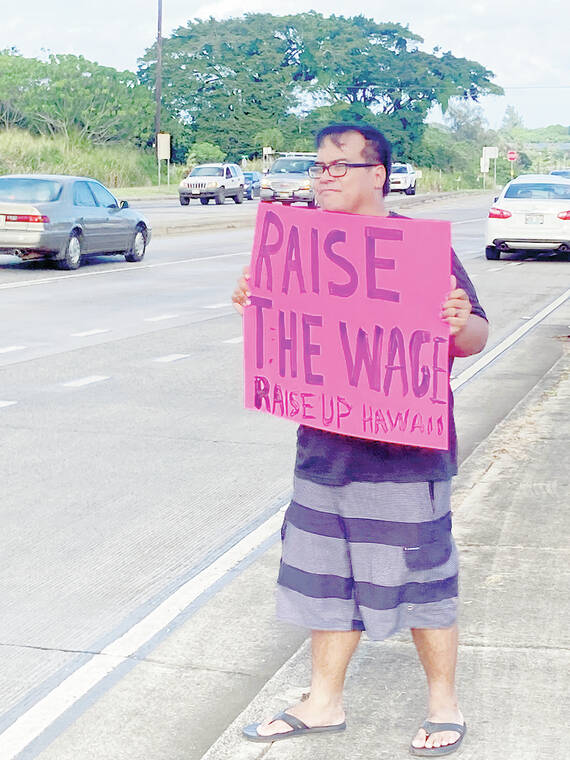HONOLULU — State legislators voted Monday to pass a historic bill raising the minimum wage to $18 an hour by 2026 through the Senate Committee on Labor, Culture and the Arts, the first step in a long process to make the bill a reality.
Senate Bill 2018 would increase the minimum wage for certain employees incrementally to $12 per hour in October of this year, $15 per hour in 2024, and $18 per hour in 2026.
The committee meeting featured robust public testimony on both sides of the issue, with individuals and community organizations speaking in favor of the bill while business groups spoke in opposition.
“As a 19-year-old that was born and raised here, it remains one of my greatest fears that no matter how hard or how many hours I work, I won’t be able to live in Hawai‘i after college,” said resident Mari Ebersol, who supported the bill. “So many people in my generation have been displaced.”
Ebersol and other proponents of the bill offered amendments, including eliminating the tip credit, which allows businesses to pay tipped employees a sub-minimum wage.
“Every worker should earn a living wage and should not have to worry about if a customer will actually tip or not to put food on their table and a roof over their heads,” said Michael Golojuch of the Stonewall Caucus.
Another amendment discussed by members of the public was indexing the minimum wage to match the cost of living, meaning that the minimum wage would increase naturally as the cost of living increases.
Among those opposed to the bill included the Hawai‘i Food Industry Association, Maui Chamber of Commerce, Retail Merchants of Hawai‘i and the Hawai‘i Restaurant Association.
Several of these organizations said that they were not opposed to a minimum-wage increase in general, but that the current timeline would be too onerous for businesses.
“We appreciate a staggered approach, but this is moving much too quickly,” said Pamela Tumpap of the Maui Chamber of Commerce, who spoke to some of the struggles businesses are facing. She cited a poll of businesses her organization had conducted which said that 21% felt that they would close if they had to pay the $18 wage.
Multiple business groups offered amendments that would set the minimum wage at a lower level or slow the increase.
The committee received more than 100 pieces of written testimony on the bill. Ultimately, the bill passed the committee unanimously, without any changes to the timeline or to the tip credit.
The increase would be historic, giving the state the highest minimum wage in the nation, matching its highest-in-the-nation cost of living. This high cost of living is particularly pronounced on Kaua‘i, which is the most expensive of all the islands.
A new state report estimates Kaua‘i “self-sufficiency wage” — the amount needed to cover basic housing, food, transportation and other costs — is $40,830 for a single adult. A person working at the current minimum wage of $10.10 an hour would make just $21,008 a year.
Based on this report, a person working full-time would need to make $19.62 an hour to afford the cost of living on Kaua‘i.
Christy MacPherson, of the pro-minimum-wage group Raise Up Hawai‘i, said that because of this disparity between wages and cost of living, many workers in her organization needed multiple jobs to support their families.
“This will help people get out of poverty and improve their quality of life,” MacPherson said. “These people will be able to have more time to spend with their families.”
The bill will next go to the Ways and Means Committee and must pass two readings in front of the full Senate before it is passed along to the House.
Senate President Ron Kouchi has already expressed support for the bill, saying it was “past due.”
“The speaker (of the House Scott Saiki) said he’d like to get there in his opening-day speech,” Kouchi said. “So I’m optimistic that both the House and Senate will be in agreement.”
•••
Guthrie Scrimgeour, reporter, can be reached at 647-0329 or gscrimgeour@thegardenisland.com.





Perfect timing to help increase inflation. Prices on everything will continue to increase, and any pay increase (and more) will be wiped away as a result. It’s just common sense that employers have to increase prices to meet increased expenses.